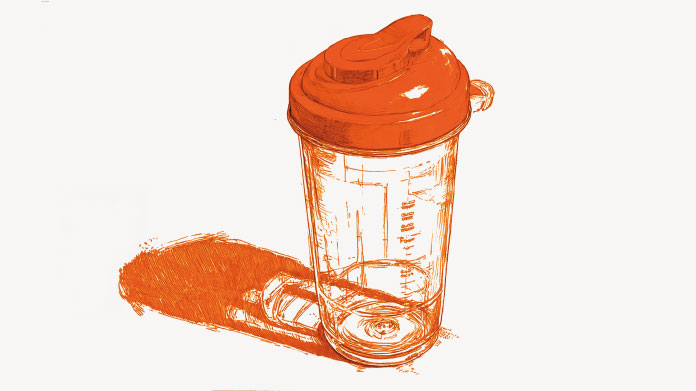Does taurine stop you sleeping?
Taurine gets something of a bad rap. But did you know that it’s naturally produced by the body? Discover the (unexpected) effects of this substance – particularly on sleep

What exactly is taurine?
Taurine is a sulphur-containing amino acid derivative produced naturally by the human body. It is found in the blood vessels, retina, muscles, brain ...
Present in many animal species, it is also available from the diet, from foods such as meat, shellfish and seaweed (1).
The origin of the word ‘taurine’
This substance was discovered in the 19th century by German scientists. They extracted it from the bile of bulls, hence the name ‘taurine’, though it is not exclusive to this animal.
Before we explore its effects on sleep, let’s first review taurine’s well-established effects.
It facilitates and prolongs recovery
Essential to health, taurine is particularly important for movement. It thus helps provide energy for your physical activities.
One of its positive effects, well-known by sportspeople, is its ability to improve performance, including endurance. Some athletes therefore use taurine supplements (Taurine 1000 mg) to help prevent cramps, sore muscles and other discomfort.
At the right dose, this type of product is effective at supporting post-exercise muscle recovery. (2-3)
It is also a powerful antioxidant
As an antioxidant, taurine also supports the body’s cells (4-6). For example, it plays a role in maintaining the heart. (7)
It can slow down the ageing process and may thus prevent a number of health problems such as age-related macular degeneration. (8)
An amino acid derivative that benefits the digestive system
In addition, taurine promotes secretion of bile salts and thus supports effective elimination of waste products from the body. It helps maintain a healthy gut. (9)
It also encourages good absorption of fats, which may help prevent obesity. (10)
Taurine and bull testicles: an enduring misconception
There are many mistaken beliefs about taurine.
One is that it is made from bull testicles. It’s not. As described, this substance is produced by the body and obtained from a variety of ‘normal’ foods.
Is it a stimulant?
Another misconception is that taurine is a stimulant. It’s nothing of the sort.. It instead plays a stimulant role, which is not the same thing. (11)
Its reputation as a stimulant comes from confusion over energy drinks, which often combine taurine and caffeine. And it’s the latter, not taurine, which is responsible for the drink’s stimulating effects.
Is taurine bad for sleep?
Now for the key question: does taurine stop you sleeping?
Following on from the previous point, many people think that taurine is bad for sleep. Again, this is a fallacy. According to some studies, taurine may even help you get to sleep!
An American study compared the effects of caffeine and taurine on drosophila flies. Researchers observed that insects given a dose of caffeine had difficulty getting to sleep, while administration of taurine strongly promoted drowsiness (12).
This substance may actually have an anxiolytic (anti-anxiety) effect(13). It’s known that taurine directly affects GABA, an inhibitory neurotransmitter of the central nervous system, which is able to increase calmness and serenity. (14) Perfect for inducing a good night’s sleep and ensuring you wake up in tip-top form.
A lack of taurine, however, is clearly associated with stress, and therefore poor sleep. Supplementing with taurine may thus help to relieve these symptoms (15).
Maintain good physical condition at the same time as ensuring quality sleep
By choosing to supplement with taurine (Taurine 1000 mg), you can improve your physical capacity, reduce aching muscles, and slow down ageing of your cells … And all without impairing the quality of your sleep, indeed, you may even improve it.
If you want to do even more to aid your recovery and facilitate the renewal of your muscle mass, why not take advantage of the benefits offered by the amino acid glutamine (try L-Glutamine). As for antioxidants, we’d suggest a specialised supplement such as AntiOxidant Synergy.
And if you often have trouble getting to sleep, or wake frequently in the night, there are also specific supplements for addressing insomnia such as Advanced Sleep Formula
References
- Lise Lafaurie, nutritionniste à Paris, pour Le Journal des Femmes – Santé, Taurine : les effets secondaires, article modifié le 25/04/19
- Waldron M, Patterson SD, Tallent J, Jeffries O. The Effects of an Oral Taurine Dose and Supplementation Period on Endurance Exercise Performance in Humans: A Meta-Analysis. Sports Med. 2018;48(5):1247-1253. doi:10.1007/s40279-018-0896-2
- Geiß KR, Jester I, Falke W, Hamm M, Waag KL. The effect of a taurine-containing drink on performance in 10 endurance-athletes. Amino Acids. 1994;7(1):45-56. doi:10.1007/BF00808445
- Jong CJ, Azuma J, Schaffer S. Mechanism underlying the antioxidant activity of taurine: prevention of mitochondrial oxidant production. Amino Acids. 2012;42(6):2223-2232. doi:10.1007/s00726-011-0962-7
- Yildirim Z, Kiliç N, Ozer C, Babul A, Take G, Erdogan D. Effects of taurine in cellular responses to oxidative stress in young and middle-aged rat liver. Ann N Y Acad Sci. 2007;1100:553-561. doi:10.1196/annals.1395.061
- Zhang M, Izumi I, Kagamimori S, et al. Role of taurine supplementation to prevent exercise-induced oxidative stress in healthy young men. Amino Acids. 2004;26(2):203-207. doi:10.1007/s00726-003-0002-3
- Schaffer S, Kim HW. Effects and Mechanisms of Taurine as a Therapeutic Agent. Biomol Ther (Seoul). 2018;26(3):225-241. doi:10.4062/biomolther.2017.251
- Froger N, Moutsimilli L, Cadetti L, et al. Taurine: the comeback of a neutraceutical in the prevention of retinal degenerations. Prog Retin Eye Res. 2014;41:44-63. doi:10.1016/j.preteyeres.2014.03.001
- Sukhotnik I, Aranovich I, Ben Shahar Y, et al. Effect of taurine on intestinal recovery following intestinal ischemia-reperfusion injury in a rat. Pediatr Surg Int. 2016;32(2):161-168. doi:10.1007/s00383-015-3828-3
- Murakami S. Role of taurine in the pathogenesis of obesity. Mol Nutr Food Res. 2015;59(7):1353-1363. doi:10.1002/mnfr.201500067
- Lise Lafaurie, nutritionniste à Paris, pour Le Journal des Femmes – Santé, Taurine : les effets secondaires, article modifié le 25/04/19
- Dale F. Whelehan, Cathleen A. McCarrick, Paul F. Ridgway, A systematic review of sleep deprivation and technical skill in surgery, The Surgeon, 10.1016/j.surge.2020.01.004, (2020)
- Kong WX, Chen SW, Li YL, et al. Effects of taurine on rat behaviors in three anxiety models. Pharmacol Biochem Behav. 2006;83(2):271-276. doi:10.1016/j.pbb.2006.02.007
- Ochoa-de la Paz L, Zenteno E, Gulias-Cañizo R, Quiroz-Mercado H. Taurine and GABA neurotransmitter receptors, a relationship with therapeutic potential?. Expert Rev Neurother. 2019;19(4):289-291. doi:10.1080/14737175.2019.1593827
- Xu YJ, Arneja AS, Tappia PS, Dhalla NS. The potential health benefits of taurine in cardiovascular disease. Exp Clin Cardiol. 2008;13(2):57-65.
Keywords
2 Days
Great product
Great product, but still evaluating its effectiveness. Highly recommended. Super efficient delivery.
Chalise
6 Days
Quality products
Quality products , efficient and effective customer service. You can’t ask more
CLaudia
12 Days
Good quality product and customer service.
So far, I'm liking this product, and the customer service was very good.
ELZL
19 Days
The products I use are excel·lent
The products I use are excel·lent
ROSAS Josep Maria
27 Days
Delivery is prompt and I never saw a…
Delivery is prompt and I never saw a quality problem with the manufacturing. It is not possible to assess efficacy on a personal basis, since too many factors come into play. Efficacy can only be assessed statistically with a sufficient number of cases.
Roger De Backer
28 Days
I collaborates with the Supersmart…
I collaborates with the Supersmart more than 10 years. Every thing is going good. Quality of the things is good. Delivery comes in time. Five stars definitely !!!
Oleksiy
28 Days
All good
Simple, frictionless site, easy ordering, good delivery updates and execution.
Chris Robbins
30 Days
I feel better
I feel better
Peter Ammann
30 Days
Prompt delivery
Prompt delivery
JAKUB Radisch
32 Days
My new go-to for top quality supplements!
I am buying more and more of my supplements from this superb, high quality company. Cannot recommend it enough. Plus, excellent customer service with a quick, helpful team and speedy deliveries. Highly recommend Supersmart!
Cecilie H.
35 Days
SUPERSMART WHAT ELSE👍
SUPERSMART WHAT ELSE👍
DIEDERLE Christophe
38 Days
Excellent quality products with…
Excellent quality products with innovative formulas, as someone who has been suffering with acid reflux, these supplements have been lifesavers.
Oriana Moniz
38 Days
high quality supplement!
high quality supplement!
GALANT
39 Days
Good service prompt delivery
Good service prompt delivery
Mrs Marcella Reeves
44 Days
I like your clear explanation
I like your clear explanation. And how to make a choice of products for a specific health problem
Ingrid



